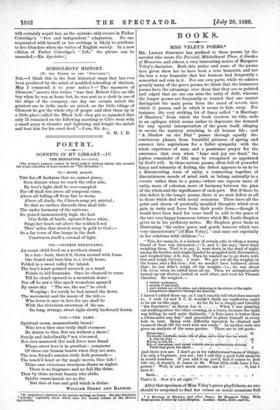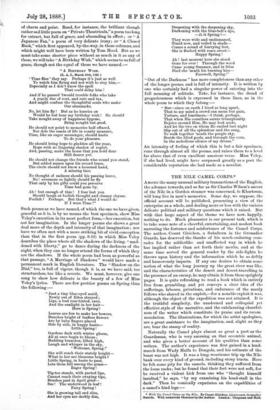BOOKS.
MISS VELEY'S POEMS.*
MR. LESLIE STEPHEN has prefixed to these poems by the novelist who wrote For Percival, Mitchelhurst Place, A Garden of Memories, and others, a very interesting notice of Margaret Veley's character. Both this notice and some of the poems
here given show her to have been a true humorist, and not the less a true humorist that her humour had frequently a somewhat sad vein in it. For our own parts, while we admire greatly many of the grave poems, we think that the humorous poems have the advantage over them that they are so pointed and edged that no one can miss the unity of drift, whereas the longer poems are frequently so treated that one cannot distinguish the main poem from the mood of reverie into which it passes, and in which it seems to fade away. For instance, the very striking bit of fancy called "A Marriage of Shadows," from which the book receives its title, ends in an epilogue which seems rather to deprecate the demand for any special interpretation of the poem itself, alleging in excuse the mystery attaching to all human life ; and " A Shadow on the Dial " passes through equally dis- continuous phases, from beautiful pictures of spring and summer into aspirations for a fuller sympathy with the whole experience of man, and a passionate prayer for the assurance that even when " hope and joy are dead," the joyless remainder of life may be recognised as appointed by God's will. In these serious poems, often full of powerful fancy and intensity of feeling, the defect appears to us to be a disconcerting want of unity, a connecting together of discontinuous moods of mind such as belong naturally to a.
reverie rather than to a poem,—where one expects more of unity, more of cohesion, more of harmony between the plan of the whole and the significance of each part. But if there be this defect in the longer poems, there is no such defect at all in those which deal with social occasions. These have all the point and charm of poetically moulded thoughts which even gain in unity and force from their poetic form,—though it would have been hard for verse itself to add to the grace of the two very happy humorous letters which Mr. Leslie Stephen gives us in his prefatory notice. Mr. Stephen gives them as illustrating "the rather grave and gentle humour which was very characteristic" [of Miss Veley], " and came out especially in her relations with children :"— " This, for example, is a history of certain cats in whom a young
friend of hers was interested L. and I,' she says, have been weighing them. That is to say, L. went down in the dead of night among the beetles, and single-handed he grappled with Zo(roaster), and weighed him : 2 lb. 9oz. Then he wanted me to go down with him and weigh Cy(rus). I went. We got out all the weights in the house, and a flat iron ; but we needn't have bothered about that : he just didn't weigh all the weights—i.e., be was about 7 lb. 15 oz. when we added them all up. Then we metaphorically turned up our sleeves, looked at each other, and went for Thomas Claudius. He weighed :— 1 violent scrimmage, 1 scratch (I had that).
1 scale kicked out of its place, and clattering,in the silence of the night. 1 tempestuous departure through the doorway.
I haven't added these np ; so I can't exactly tell what they amount to. I wish Cy and T. C. D. wouldn't think my sunflowers ought to be sat on like eggs As for Zo he is simply and literally " the Desolator," as Byron has it When I was planting out seedling asters the other evening, in a hurry, because the light was failing, he said quite distinctly, " A Zoro-aster is better than a China-aster any day," and proceeded to plant himself in every hole in turn. Being with difficulty uprooted, he climbed and bounced about till the next hole was ready.' In another note she gives an analysis of the same garden. ' There are in 100 parts :
Potsherds, brickbats, bones, bits of glass, and a rusty iron bar which Bits of newepaper, and varied rubbish always mysteriously arriving. Think they grow, but about 2
And there you are. I don't go in for infinitesimal traces of things_ I'm only a beginner, you see; but I call this a good bold analysis in round numbers. If you add it up you'll find it comes to just 100—no, it doesn't, it comes to 99. What little trifle have I for-
gotten ? Well, it can't much matter, can it ? 0, but I have it :
That's it. Now it's all right.'"
After that specimen of Miss Veley's grave playfulness, no one should be surprised to find her verses on social occasions full
• A Marriage of Shadows, said other Poems. By Margaret 'Foley. With Biographical Preface by Leslie Stephen. London : Smith, Elder, and Co.
of charm and point. Read, for instance, the brilliant though rather sad little poem on " Private Theatricals," a poem too long for extract, but full of grace, and abounding in effect ; or " A Japanese Fan," a poem of very delicate irony; or " A Closed Book," which first appeared, by-the-way, in these columns, and which might well have been written by Tom Hood. But as we must take some shorter piece without as much in it as any of these, we will take "A Birthday Wish," which seems to us full of grace, though not the equal of those we have named :—
" A BIRTHDAY NV
(L. A. I., March 10th, 1881 )
Time flies' they say. Perhaps it's just as well To watch him flying and not wish to stay him,— Especially as I don't know the spell That could delay him !
And if he paused 'twould trouble folks who take A yearly due of rent, and rate and tax, And might confuse the thoughtful souls who make Our almanacks
No, let him fly ! But as he hurries on Would he but hear my birthday wish ! He should Take nought away of happiness bygone, Bring nought but good.
He should not point to memories half effaced, Nor dole the sands of life in scanty measure, Time, like an eager messenger, should haste To do your pleasure.
He should bring hope to gladden all the year, Hope with no lingering shadow of regret, And, passing, make the home that you hold dear Still dearer yet.
He should not change the friends who round you stand, But added names upon his record trace, The circle should not know a loosened hand, A missing face.
No thought of sadness should his passing leave, No ! evermore so lightly should he fly That only by his gifts could you perceive Time had gone by.
Ah ! but enough of this ! I fear lest you Should laugh at foolish thought and clumsy rhyme. Foolish ? Perhaps. But that's what I would do If I were Time !"
Such poems as we have named, of which the one we have given, graceful as it is, is by no means the best specimen, show Miss Veley's execution in its most perfect form,—her execution, but not her imagination. In the longer poems she shows a great deal more of the depth and intensity of that imagination ; nor have we often met with a more striking bit of vivid conception than that in the first poem (pp. 8-10) in which Miss Veley describes the place where all the shadows of the living, " mad- dened with liberty," go to dance during the darkness of the night, when they can no longer attend the forms of which they are the shadows. If the whole poem had been as powerful as that passage, " A Marriage of Shadows " would have made a permanent mark in English literature. The " Shadow on the Dial," too, is full of vigour, though it is, as we have said, too structureless, too like a reverie. We must, however, give one song to show how delicate is the beauty of a few of Miss Veley's lyrics. There are few prettier poems on Spring than the following:— "Just a tiny blue-eyed maid, Newly out of Eden strayed ; Lips, a bud rose-tinted, rare, And the sunlight in her hair—
Here is Spring !
Leaves are few to make her bowers, Bunches bright of leafless flowers Are by baby fingers placed
Side by side, in happy haste—
Little Spring!
Gardens dark with winter gloom, All at once begin to bloom ; Budding branches, lifted high, Laugh and whisper in the sky, Welcome, Spring !'
She will reach their stately height— What to her are blossoms bright ? Little Spring, in haste to pass, Lets them fall among the grass—
Eager Spring !
Tip-toe stands, with parted lips, Cannot reach their swaying tips, Brushes past in April grief— See ! The underwood in leaf !
Fairy Spring!!
She is growing tall and slim, And her eyes are darkly dim,
Deepening with the deepening sky, Darkening with the blue-bell's dye, Is it Spring?— They were wide and undismayed, Timid now, and veiled in shade— Comes a sound of hurrying feet, She is flushed with roses sweet—
Happy Spring !
Ah ! last moment here she stood. Gone for ever 1 Through the wood Came young Summer, and in bliss Died she 'neath his burning kiss—
Farewell, Spring !"
" Out of the Darkness " has more completeness than any other of the longer poems, and is full of intensity. It is written by one who certainly had a singular power of entering into the full meaning of solitude. Take, for instance, the dread of gregariousness which is expressed in these lines, as in the whole poem to which they belong :- "But—since on earth I lived so long apart, That to my mind a crowd can mean but pain, Torture, and loneliness, —I think, perhaps, That when His countless saints triumphantly Rejoice around Him, He may look aside, And let the two on whom He smiled last night Slip out of all the splendour and the song, To walk together 'neath the purple sky, Beside the lilied pools, and through the corn, In the melodious silence of my dream."
An intensity of feeling of which this is but a fair specimen, runs through almost all the poems, and raises them to a level far above that of even excellent amateur verse. Miss Veley, if she had lived, might have surpassed greatly as a poet the considerable reputation she had made as a novelist.



































 Previous page
Previous page